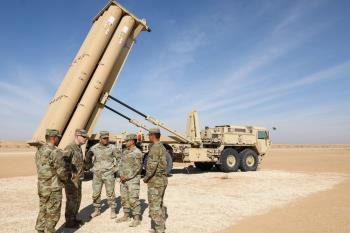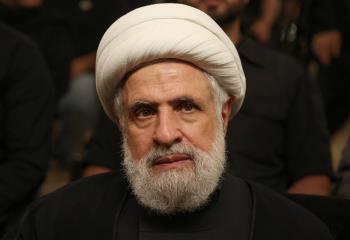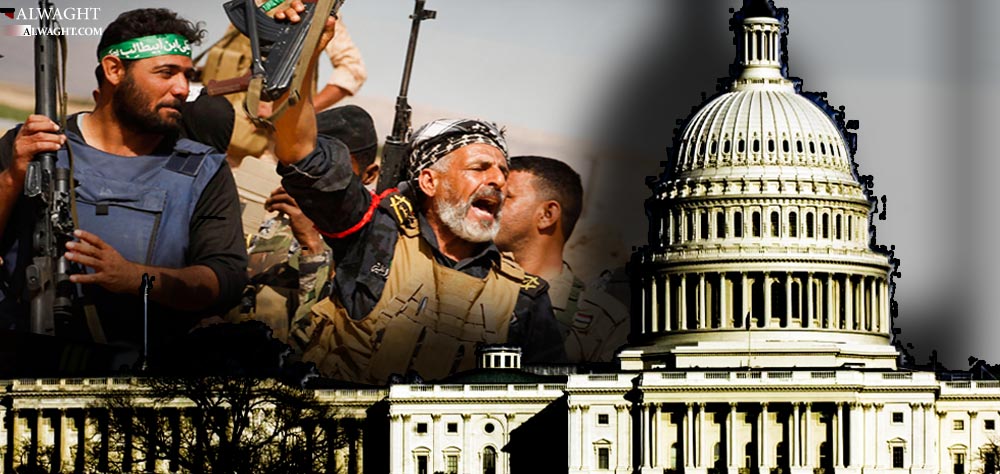Alwaght- Recently, there have been speculations on possible deployment of Iraq's Public Mobilization Forces (PMF) to Syria to fight against terrorists in the neighboring country. The issue has raised the hackles of the White House officials. Because if the Syrian government officially call on Iraq to send the PMF, also known as Hashd al-Shaabi, to Syria for anti-terror fight, Iraqi government and parliament will very likely agree to the request. In this case, the successful Iraqi experience of the presence of the popular forces in battle against the terrorists will be repeated in Syria, leading to a strengthened anti-terror front in the crisis-hit country.
“After liberation of Mosul, the voluntary Iraqi forces are ready to go to Syria,” said Ahmad al-Assadi, the spokesman for the PMF, commenting on the issue.
The dependence of security of Iraq on the Syrian developments and recent Syrian military gains over the terrorists motivated the popular Iraqi forces to announce readiness for entry to the Syrian crisis if necessary. Putting forward the issue will likely push Baghdad government to give the PMF the necessary legal authorization to deploy forces to Syria.
Iraq has been battling the ISIS terrorist group for over 30 months, a battle that destroyed the country’s cities and infrastructures, displaced millions, and killed thousands of Iraqi citizens. So with regard to the considerable joint army and PMF advances against the terrorists, the Iraqi leaders are not interested in seeing resurfacing of the ISIS ideology in the country in the near future. To this end terrorism should be annihilated in Syria too. .
Therefore, it seems that despite US President’s call on Iraqi Prime Minister Haider ak-Abadi to avoid sending PMF to Syria in a phone conversation between the two leaders, Baghdad will deploy popular forces to Syria if Syrian government asks for.
But why does the US raise concerns over presence of the popular Iraqi forces in Syria?
First of all, the Popular Mobilization Forces formed after a fatwa by the grand Shiite cleric in Iraq Ayatollah Sayyed Ali al-Sistani in a bid to preclude ISIS progress toward the capital Baghdad and the country’s southern provinces. Responding to the call, the Shiites, Sunnis, Christians, Turkmens, Shabaks, and people from other ethnic groups formed a joint force, dubbed as Hashd al Shaabi or Public Mobilization Forces, in defense of their territories.
The popular forces, armed with light weapons, began their duty in al-Taji, a rural district north of Baghdad, under leadership of the former Iraqi PM Nouri al-Maliki, who was also commander-in-chief. Defeating ISIS in al-Taji, PMF launched operations against the terrorist group in Samarra, Salahuddin, and al-Anbar. As the PMF showed its capabilities in war against terrorism, the country’s parliament recognized it as a “regular military force” just like other military forces in Iraq. The Recognition meant that PMF to continue living even after full liberation of all of Iraq’s territories from the grasp of terrorism. Now, the armed organization can legally act as a sovereignty-protecting force.
It is based on this authorization that Faleh al-Fayaaz, the chief of PMF and the country’s national security advisor, earlier said that “following Tal Afar recapture, Hashd al-Shaabi along with other Iraqi military forces will be tasked with controlling the Iraqi-Syrian borders."
If PMF had not been formed, Iraq's developments could have been taken place differently, maybe with ISIS occuping Baghdad and other southern provinces.
So notwithstanding an emphasis by Prime Minister al-Abadi on avoiding Baghdad's involvement in the regional and international developments, it is very likely that the PMF will enter Syria solely to protect the Iraqi security against any prospective power gain of ISIS.
But on the opposite side, Washington, Riyadh and Tel Aviv are worried that this scenario can be quite dangerous to their goals and schemes in the region as they know that the basis for formation of the force was a fatwa of a Shiite cleric. PMF, like Iraq's population that Shiites make its majority, is Shiite dominated.
Furthermore, according to the Iraqi law, this popular force is not under command of the defense ministry and is only supported logistically by the ministry. In the eyes of the US and its allies, this issue beside predominantly Shiite makeup of the PMF grants the Shiites of Iraq sizable military power, enabling them influence the future political of Iraq.
Presence of PMF in Syria and further breakthroughs in the neighboring country will add to the volunteer force's popularity, not to mention the fact that war in new country will enrich the group’s operational experiences. With this in mind, Washington is actually worried about rise of another Hezbollah in West Asia region.
Meanwhile, recent remarks of the PMF spokesman have practically sounded the alarm bells for the West. Al-Assadi has recently said “we see that the US comes from another continent to the Middle East and intervenes in the regional countries affairs. We, as neighbors of Syria, should enter this country to defend it.”
Regarding the fact that security of Iraq's security is interwoven by Syria's security, the US pressures on Iraq will go nowhere when it comes to Baghdad’s decision to send popular forces to Syria. In fact, the anti-oppression spirit of these voluntary forces makes the West find good reasons to fear birth of a second Hezbollah.



























